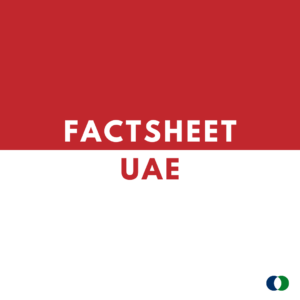Last updated: August 22nd, 2024
The United Arab Emirates (UAE) are located on the Arabian Gulf and are around four times smaller than Germany. Its neighboring countries are Oman and Saudi Arabia. The population is around 10 million, 87.9% of whom are foreigners. The UAE is federally organized. The largest emirate and also the capital of the federation is the oil-rich Abu Dhabi. The Emir of Abu Dhabi, H.H. Sheikh Muhammad bin Rashid Al Nahyan (since May 2022), is also the President of the UAE. The second largest emirate is Dubai.
The UAE is a member of numerous international organizations such as the UN, the Arab League and the Gulf Cooperation Council. In January 2018, its member states (in addition to the UAE Bahrain, Qatar, Kuwait, Oman and Saudi Arabia) introduced a value added tax of five percent. From 2016 to 2018, the UAE was represented with a seat on the Executive Council of the UN Entity for Gender Equality and the Empowerment of Women. Abu Dhabi is the seat of the International Renewable Energy Agency (IRENA), founded in 2011.
It is important to note that the UAE were one of the rare Arab countries that did not experience the ‘Arab Spring’, partly due to the significant infrastructure spending in the poorer northern emirates. They have also shown that they are capable of being a major regional player, both diplomatically and militarily, not only as part of the Gulf Cooperation Council, but also as a major partner of Saudi Arabia and as one of the first Arab countries to normalize its relations with Israel.
The UAE are home to the seventh-largest oil reserves and the sixth-largest proven gas reserves in the world. Sales from oil and gas production account for 40 percent of GDP. The industrial and service sectors account for the majority of GDP, with almost equal shares of 49.8 percent and 49.2 percent respectively. The industry mainly produces fuels and chemicals, aluminium, cement and fertilizers. The UAE is one of the richest countries in the world. GDP per capita is around 53,758 US dollars. According to Transparency International, the UAE was the least corrupt Arab country for the seventh consecutive year in 2022, ahead of Qatar, with a continued ranking in the top 30 out of 180 countries surveyed.
For Germany, the UAE is the largest Arab trading partner with a total trade volume of around USD 10.21 billion (2022, of which around USD 7.85 billion are German exports). Germany mainly exports aircraft, motor vehicles and motor vehicle parts, other vehicles, machinery and electrical products, while almost half of German imports from the UAE consist of metals.
One of the UAE’s most important economic policy measures is to diversify the economy by focusing on logistics, trade, trade fair traffic, tourism, financial services, energy- and capital-intensive industries such as steel and aluminum production as well as high technologies such as microchip production and renewable energies. Due to its role as a hub for the international movement of people and goods, the United Arab Emirates was hit hard by the Covid-19 pandemic, causing the economy to shrink by 6.1 percent in 2020. However, the government responded swiftly with a rapid vaccination program and billions in investment, which reinforced existing efforts to improve education and job prospects. The recovery in growth had already been estimated at 3.8% in 2021; for 2022 it is even 5.1% and for 2023 it is still 4.2%.
- Ministry of Cabinet Affairs
- Ministry of Climate Change & Environment
- Ministry of Communal Development
- Ministry of Culture
- Ministry of Defense
- Ministry of Economy
- Ministry of Education
- Ministry of Energy and Infrastructure
- Ministry of Foreign Affairs and International Cooperation
- Ministry of Health and Prevention
- Ministry of Human Resources and Emiratization
- Ministry of Interior
- Ministry of Justice
- Ministry of State for Federal National Council Affairs
- Ministry of Tolerance
- Presidential Court
-
- Abu Dhabi Businesswomen Council
- Abu Dhabi Chamber
- Ajman Chamber
- German-Emirati Chamber of Commerce and Industry
- Dubai Business Women’s Council (DBWC)
- Dubai Chamber
- Federation of United Arab Emirates Chambers of Commerce & Industry (under construction)
- Fujairah Chamber of Commerce and Industry
- International Chamber of Commerce
- RAK Chamber (EN and AR)
- Sharjah Chamber of Commerce and Industry
- Albawaba (EN and AR)
- Al Bayan (AR)
- Al-Ittihad (AR)
- Dubai Chronicle (EN)
- Gulf News (EN)
- Khaleej Times (EN)
- The National (EN)
-
- Abudhabi.com (travel information)
- General Authority for Pensions and Social Insurance (AR)
- Central Bank of the UAE
- Emirates Post Group
- Federal Customs Authority
- Federal Electricity & Water Authority
- General Authority of Islamic Affairs & Endowments
- General Civil Aviation Authority
- Securities & Commodities Authority
- Tanmia – The National Human Resources Development & Employment Authority
- Telecommunications and Digital Government Regulatory Authority
- Zakat Fund
Current tenders

